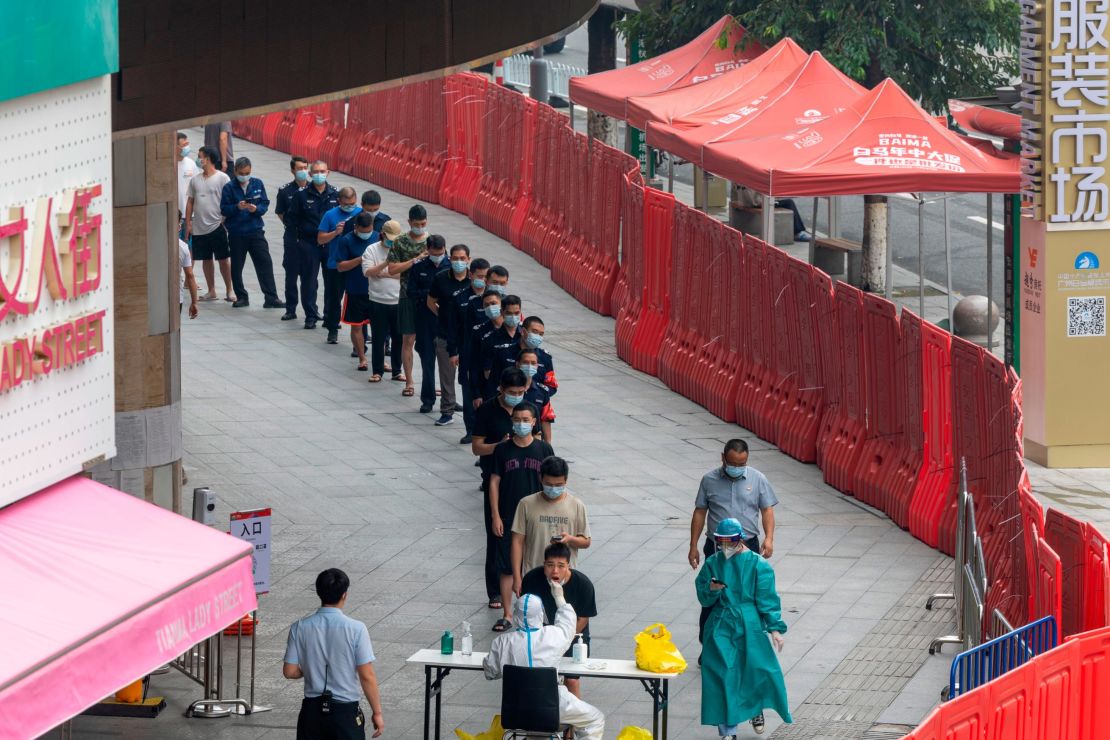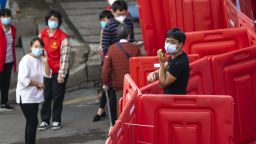Editor’s Note: Matthew Bossons is an editor and journalist based in Shanghai. He has lived in China since 2014. The views expressed in this commentary are his own. View more opinion on CNN.
In the lead-up to China’s Communist Party Congress last month, watercooler chatter in many offices here focused on a single question: Will the Congress abandon its zero-Covid policy?

It didn’t take long for an answer. In his opening speech, Chinese President Xi Jinping reaffirmed the nation’s commitment to zero-Covid — a stance made all the more inviolable since securing his unprecedented third term.
I can confirm that zero-Covid is alive and well. In the weeks since Xi’s speech, I’ve had dozens of nucleic acid tests, canceled a domestic work trip and seen multiple colleagues hauled off to quarantine hotels or locked down at home. (On Friday, China announced limited easing of some measures — though no mention of when the changes would take effect.)
Students in many cities in China are back to remote learning. My 5-year-old daughter is on her second week off school after her kindergarten closed due to restrictions related to Covid-19. At this point, she has spent more time at home in 2022 than in the classroom.
Restrictions at a moment’s notice have made it nearly impossible to plan more than 20 minutes ahead of time. This is bad for business, of course, but it also affects ordinary people’s ability to go about their lives — you never know when you might get locked down in your apartment, workplace, a local mall or even Shanghai Disneyland.

Some friends, who have suffered through an unexpected lockdown or two, have even taken to carrying a backpack full of clothes, toiletries and work essentials with them at all times in case they get trapped at the local pub.
While I fully agree that China’s hard-line approach to Covid-19 containment has saved lives, the policy’s impacts are beginning to seem worse than the disease.
Economically speaking, all is not well in China, and the situation is at least partially to blame on China’s uncompromising stance on Covid-19.
One in five urban youth in the country are jobless, business meetings and trade shows are being postponed or canceled, and workplaces are regularly shuttered over concerns about the coronavirus, including the recent lockdown at a Foxconn manufacturing center — which left employees literally fleeing down a highway.
Downright illogical
China’s anti-virus measures are becoming increasingly difficult to defend as implementation becomes inconsistent and, at times, downright illogical.
Last week I returned to Shanghai from Guangzhou — a city in southern China dealing with a Covid-19 outbreak — and left the airport without so much as a peep about quarantining or self-isolating.
I walked around Shanghai — riding public transit, sitting maskless in an office, cramming in packed elevators — for three days before public health authorities contacted me and told me I needed to quarantine.
You would presume that traveling from a city with a well-publicized disease outbreak would be enough to warrant immediate notice of self-isolation upon debarking the plane. Alas, not.
But here’s the real kicker: While I needed to stay home for four days, my wife and daughter, who live with me, were allowed to leave the apartment and wander around the city at will. Now, let’s assume I was infected with the virus and that my family were now carriers: Why would a policy intended to protect people’s health “to the greatest extent possible,” to quote Xi, allow for such a flagrant risk to public wellness?
Looming mental health crisis
Most troublingly, I suspect China is on the verge of an explosive mental health crisis caused — or exacerbated —- by the isolation and uncertainty that come with prolonged and unexpected lockdowns.
Demand for counseling services is up, and a nationwide survey conducted across China in 2020 found that nearly 35% of respondents were dealing with psychological distress amid the pandemic.
During Shanghai’s marathon two-month lockdown this year, phones were reportedly ringing off the hook at the offices of mental health specialists. In my apartment complex, two people tragically took their lives during the citywide shutdown, and speculation in our community chat group is that the lockdown was at least partially to blame.
Earlier this month, a 55-year-old woman reportedly suffering from anxiety disorders jumped to her death from her locked-down apartment building in the capital city of China’s Inner Mongolia autonomous region.
Her adult daughter could not exit the apartment following her mother’s suicide as the door had allegedly been “welded shut for a month.”
Also this month, a 3-year-old boy died following a suspected gas leak at a locked-down residential compound in the western city of Lanzhou. On social media, the boy’s father alleged that he tried to alert local health workers to call an ambulance but was denied prompt access to emergency services due to his Covid-19 testing status.
“My child might have been saved if he had been taken to the hospital sooner,” the father wrote in a now-deleted social media post.
Growing discontent
While there is no shortage of vocal zero-Covid defenders on Chinese social media, there are also some voicing disapproval online and offline in the country.
On the heels of the Inner Mongolia suicide, Chinese social media users lamented the role lockdowns have played in fueling mental health issues and criticized government officials for not paying attention to the needs of those trapped in their apartments.
“Over the past three years, lockdowns and epidemic prevention chaos in various parts of China have repeated … destroying the mental health of ordinary people and causing anxiety and extreme emotions, including anti-social and self-destructive behaviors,” one user wrote on Weibo, China’s Twitter-like, microblogging platform.
Following the young boy’s death in Lanzhou, the internet rage machine was running at full capacity, with related hashtags on Weibo racking up hundreds of millions of views.
Anger was primarily directed at the government’s censorship of posts related to the incident and “excessive Covid-19 prevention measures.” Unverified videos circulating online show city residents taking to the streets in a rare show of resistance, shouting at what appears to be public health workers and riot police.
Unfortunately for those hoping for a swift end to zero-Covid, negative public feedback is unlikely to result in any immediate changes. But if the economic situation does not improve and discontent grows, it could force the government to reevaluate its position — it has happened before.
After all, a dissatisfied, unemployed population is not easy to govern, even when you have the world’s shiniest array of censorship tools.
Isabel Su contributed research.




